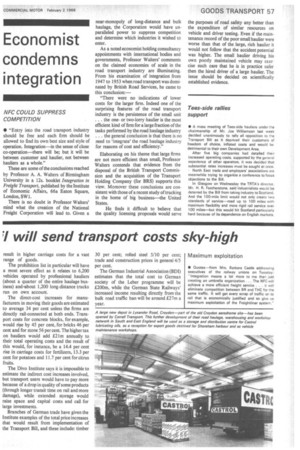Economist condemns integration
Page 59

If you've noticed an error in this article please click here to report it so we can fix it.
NFC COULD SUPPRESS COMPETITION
• "Entry into the road transport industry should be free and each firm should be allowed to find its own best size and style of operation. Integration—in the sense of close co-operation—there will be; but it will be between customer and haulier, not between hauliers as a whole."
These are some of the conclusions reached by Professor A. A. Walters of Birmingham University in a 12s. booklet Integration in Freight Transport, published by the Institute of Economic Affairs, 66a Eaton Square, London, SW1.
There is no doubt in Professor Walters' mind what the creation of the National Freight Corporation will lead to. Given a near-monopoly of long-distance and bulk haulage, the Corporation would have unparalleled power to suppress competition and determine which industries it wished to enter.
As a noted economist holding consultancy appointments with international bodies and governments, Professor Walters' comments on the claimed economies of scale in the road transport industry are illuminating. From his examination of integration from 1947 to 1953 when road transport was dominated by British Road Services, he came to this conclusion:—
"There were no indications of lower costs for the larger firm. Indeed one of the surprising features of the road transport industry is the persistence of the small unit . . . the oneor two-lorry haulier is the most efficient kind of firm for a large fraction of the tasks performed by the road haulage industry . . . the general conclusion is that there is no need to 'integrate' the road haulage industry for reasons of cost and efficiency."
Elaborating on his theme that large firms are not more efficient than small, Professor Walters contends that evidence from the disposal of the British Transport Commission and the acquisition of the Transport Holding Company (for BRS) supports this view. Moreover these conclusions are consistent with those of a recent study of trucking in the home of big business—the United States.
He finds it difficult to believe that the quality licensing proposals would serve the purposes of road safety any better than the expenditure of similar resources on vehicle and driver testing. Even if the maintenance record of the poor small haulier were worse than that of the large, rich haulier it would not follow that the accident potential was higher. The small haulier driving his own poorly maintained vehicle may exercise such care that he is in practice safer then the hired driver of a large haulier. The issue should be decided on scientifically established evidence.




































































































































































































